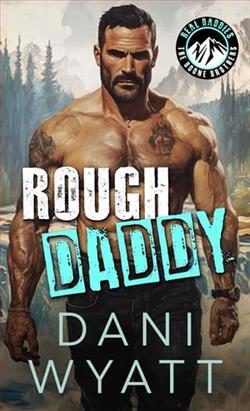Page 68 of Follow My Voice
My sister pouts dramatically but my mother forces her to turn and follow. I stand there, watching the two of them walk away, a painful reminder that there used to be more of our family. I’m not the oldest brother, that was Jung. But now he’s gone.
Would you have come to watch the game, Jung? Would you have dragged our father out to see me play?
I hear the sound of breaking glass and I rush to my older brother’s room. I fling the door open. He sits in a corner, shivering, his arms around his legs, hugging them to his body. He looks small and frail, despite being much taller than me.
“Jung,” I shout, kneeling down in front of him.
“I can’t… breathe…” he says, reaching out and grabbing my shirt.
It’s another panic attack.
Jung had suffered from severe depression and anxiety ever since a car accident in which he nearly lost his life. He spentmonths in the hospital and required extensive physical therapy to fully regain mobility. When we brought him home, we thought it was all over, that we could put that episode behind us, but we were wrong.
Jung had recovered physically, but mentally he still had a long way to go. I did all the research I could to help him deal with the panic attacks, but I knew that my brother needed professional help and medication. My father’s response when I told him broke my heart.
“No son of mine is going to go see some quack,” he says, furious. “A man should be able to deal with his problems on his own; talking about your feelings is for women. As long as you and your brother live under this roof, you’re not going to shame me in that way. Tell Jung to stop acting like a fool. He needs to come up for air. It’s all in his head—he needs to stop worrying his family.”
“Dad…” I beg with tears in my eyes. “Jung is in very bad shape. Please…”
“Are you crying?” He grabs my chin angrily. “Kang Jae-sung,” he says, spitting out my full name, “you’d better not let your brother’s weakness rub off on you. It is your duty to help him, not to become weak like him.”
Weakness… Lack of manhood. That’s what all psychological disorders were to my father. Men didn’t have those kinds of problems; you were weak if you even talked about it.
Jung had only gotten worse: hardly eating, refusing to go out, barely speaking. I couldn’t just stand by and watch, no matter what my father said. At only nineteen, I went behind my father’s back and sought out a psychologist, paying for the visit out of pocket with my own savings. The therapist referred my brother to a psychiatrist who could prescribe him antidepressants, which he needed to start taking, urgently. We made the first availableappointment with the psychiatrist for the following week. I was so worried about my brother that I slept beside him that night, checking on him constantly. I couldn’t let anything happen to him. I just had to hold out for one more week, and then the psychiatrist would help us.
Unfortunately, my father got wind of the plan and began interrogating us. He made a huge scene and we ended up missing the appointment.
Two days later, Jung died by suicide. He was twenty years old.
I remember his pale body, his face buried in the sheets, his hand dangling off the side of the bed, several bottles of painkillers lying on the floor… I stood frozen in the doorway, my hand on the doorknob, unable to move. I heard my mother’s hurried footsteps rushing past me, her wails of pain as she tried to wake Jung… and my father’s expression of shock and agony as he fell to his knees before his son’s bed. I didn’t cry, I didn’t move, I didn’t blink. My brother… was gone. He’d been crumbling right before our eyes and we hadn’t been able to help him. I didn’t do enough. I could’ve done more; I could’ve stood up to my father.
Jung…
Couldn’t you have given me a little more time? Was the pain in your soul truly so great that you had to leave me alone? Jung, I’m so sorry I couldn’t help you, that I couldn’t save you, even when you gave us so many signs.
I blamed my parents and myself for a long time. I became depressed and, ironically, my father came to my bedroom door one day and said,“You… We are going to a therapist tomorrow. Be ready at eight o’clock.”Then he left.
I wanted to shout at him, curse at him.“My brother is dead; that’s what it took to shake you out of your old-fashioned ways?”
I saw a therapist and a psychologist for a year, and, when I felt like I’d healed enough, I started college again. I’d dropped out from Duke when I noticed Jung was suffering. I couldn’t go back there,not yet—not when it reminded me of all those days I wasn’t there for Jung. My first semester at Durham Community College I began dedicating my time to helping others. That’s why I started my radio program. That’s why I decided I want to major in psychology. For Jung, so that no more lives would slip through the cracks due to lack of knowledge and awareness.
That’s also the reason I started playing soccer. It was Jung’s passion. I cheered him on at every game while he encouraged me to write songs and sing if that’s what I wanted to do. He was the only person who knew I liked to sing, the only one who accepted me fully. And I still couldn’t save him.
Whenever I sing at the bar, I picture him in the crowd, alive and smiling at me. Soccer and singing are the things that make me feel my brother the most.
My phone buzzes with a notification, and, as if in mockery, I see it’s a reminder about the deadline to sign up for the talent show in Charlotte. When Erick brought it up, I immediately shut the idea down, but I did scan the QR code to the event. Why? I don’t know. I haven’t signed up yet, and I don’t think I will. Right now, singing is a way to feel close to Jung—the bar where I perform has become a safe and comfortable space for me. Exposing myself to others makes me feel like it wouldn’t just be for Jung anymore.
I put my phone back into my pocket, and as I scan the bleachers, looking for one person in particular, a pair of hands cover my eyes from behind and I immediately recognize the familiar perfume. I pull the hands away from my face and turn around.
“Hey, champ,” she says in her usual mocking tone.
“Hey, Lizzie.”
Lizzie has been my best friend ever since we met at camp the summer after third grade. We were inseparable for a long time, deep into my senior year of high school. Then life happened, among other things, and I stopped prioritizing our friendship.
Her blond hair is in a high ponytail and her jean jacket brings out the gray of her eyes. “Kang! That was an incredible goal.” She holds up a hand and we high-five.
“You always say that.”















